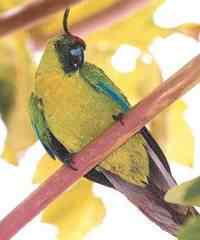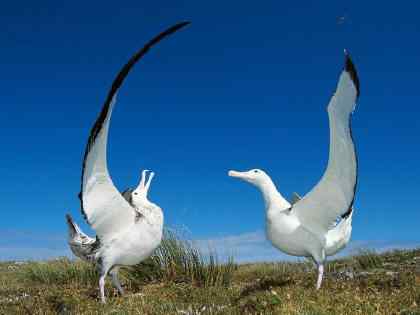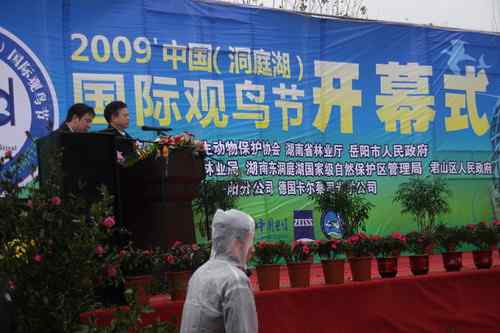鸟盟的波兰加盟团体职员获得环保诺贝尔奖
国际鸟盟的波兰加盟团体OTOP(Ogólnopolskie Towarzystwo Ochrony Ptaków , 波兰鸟类保护协会)的马伏戈尔扎塔.戈尔斯卡女士获得被誉为“环境诺贝尔奖”的戈特曼环境奖。她和波兰的鸟会成功保护了罗斯浦达河谷不受破坏环境的道路工程影响。
http://www.birdlife.org/news/news/2010/04/goldman-prize.html
BirdLife Partner staff wins world’s top environmental prize
22-04-2010
Malgorzata Górska from OTOP (BirdLife in Poland) has been awarded the world’s top prize for grassroots activists having led a successful campaign which stopped a road being built through Poland’s precious Rospuda Valley.
“Górska led the first successful environmental campaign where the EU has sued a member country to protect Natura 2000 sites”, commented David Hammerstein, former Member of the European Parliament. “This was a big deal with the new countries coming into the EU regarding the environment . [..] and the President of Poland finally had to give in to the pressure and stop the Expressway”.
The Goldman Environmental Prize – often called the Nobel Prize for the environment – is awarded to men and women around the world who take great personal risks to safeguard the environment. Throughout the campaign, Górska and her colleagues were intimidated by local authorities and radical right-wing groups, and even labelled as Russian spies.
"I'm so pleased to win the prize because this will - I hope - promote the requirements for protection of Natura 2000 sites. The Via Baltica campaign and saving the Rospuda Valley showed that it is possible to combine nature protection with transport infrastructure development. On the other hand it proved that ignoring nature conservation as a factor of sustainable development leads to serious problems", commented Górska.
Górska was awarded the prize at the San Francisco Opera House, along with $150,000 to pursue her vision of a renewed and protected environment.
The Rospuda Valley is one of the last undisturbed flora and fauna reservoirs in Europe, acknowledged for its beauty and environmental importance. Its designation as an EU Natura 2000 site should have offered it permanent protection, but it was threatened by a major road-building project – called Via Baltica - which aimed to link Helsinki and Warsaw.
Despite early opposition from scientists and conservationists, the Polish government supported the Via Baltica project believing that, having joined the EU in 2004, the new road would facilitate the increased flow of international traffic between Poland and the Baltic states.
"The Via Baltica campaign showed that it is possible to combine nature protection with transport infrastructure development" —Malgorzata Górska
To save the Rospuda Valley from destruction, Górska - alongside with her colleagues in OTOP, BirdLife International, the RSPB (BirdLife in the UK) and other NGO’s such as Polish Green Network and WWF - spearheaded the campaign against the construction of the expressway. Górska led the coalition to develop a legal case against the Polish government, coordinated research into the environmental impacts of the road construction, and raised public awareness of the irreparable damage it would cause to the area and its wildlife.
By submitting a complaint to the European Commission, an official infringement procedure was opened against the Polish government but, as the government’s response was not satisfactory, the EU referred the case against the road building to the European Court of Justice. By taking the case to the Petitions Committee of the European Parliament, Górska’s objections to the road building were adopted by the European Parliament which also called for construction to stop.
The EU presented the case against the road building in the European Court of Justice arguing that construction of the Via Baltica Expressway through the Rospuda Valley violated European laws. In March 2009, after two years in court, the new Polish government agreed to comply with EU regulations which prevent development in Natura 2000 sites, and announced that it would not build the Via Baltica Expressway through the Rospuda Valley.
“Thanks to their efforts, there is now a significant legal precedent to protect unique habitats across Europe”, added Angelo Caserta, Regional Director of the BirdLife European Division.
Górska’s challenge to the Polish government has led to the first ever successful intervention by the EU to obtain an order from the European Court to stop a Member State from breaching environmental regulations and damaging a Natura 2000 site. This court ruling now has the potential to strengthen the legal framework for EU environmental regulations across Europe, specifically the protection of Natura 2000 sites.
Following their success in saving the Rospuda Valley, Górska and her colleagues in OTOP continued to campaign to halt construction of the Via Baltica Expressway through other protected sites including the Knyszyn Primeval Forest, the Biebrza Marshes, and the Augustow Primeval Forest. Developers initially ignored strategic assessments recommending viable, less damaging alternatives but, on 20 October 2009, the Polish government finally agreed to re-route the whole controversial section of the Via Baltica Expressway, saving these valuable EU- protected sites from destruction.













发表评论:
◎欢迎参与讨论,请在这里发表您的提问或看法,交流您的观点。